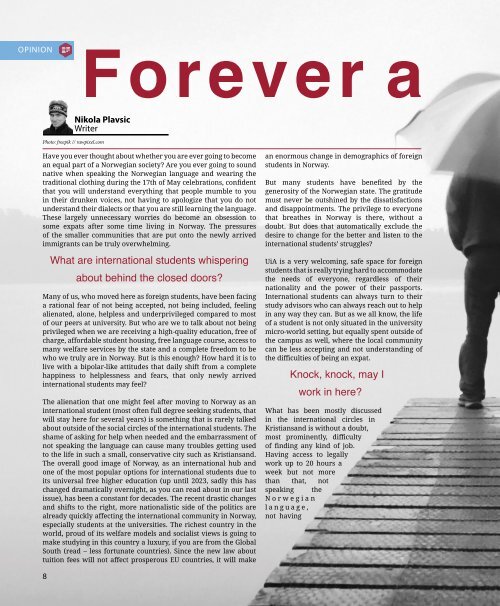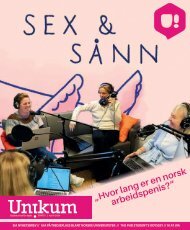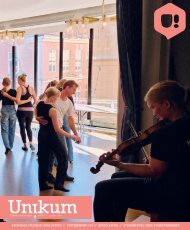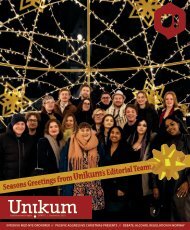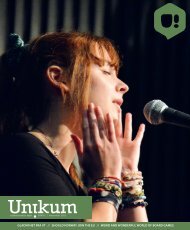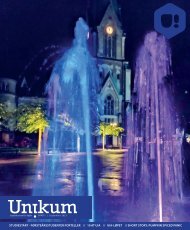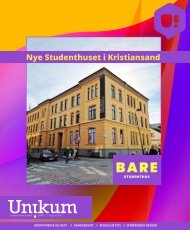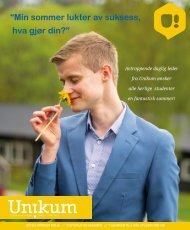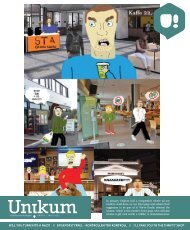MAY_UNIKUM_WEB
Create successful ePaper yourself
Turn your PDF publications into a flip-book with our unique Google optimized e-Paper software.
OPINION<br />
Forever a<br />
Nikola Plavsic<br />
Writer<br />
Photo: freepik // rawpixel.com<br />
Have you ever thought about whether you are ever going to become<br />
an equal part of a Norwegian society? Are you ever going to sound<br />
native when speaking the Norwegian language and wearing the<br />
traditional clothing during the 17th of May celebrations, confident<br />
that you will understand everything that people mumble to you<br />
in their drunken voices, not having to apologize that you do not<br />
understand their dialects or that you are still learning the language.<br />
These largely unnecessary worries do become an obsession to<br />
some expats after some time living in Norway. The pressures<br />
of the smaller communities that are put onto the newly arrived<br />
immigrants can be truly overwhelming.<br />
What are international students whispering<br />
about behind the closed doors?<br />
Many of us, who moved here as foreign students, have been facing<br />
a rational fear of not being accepted, not being included, feeling<br />
alienated, alone, helpless and underprivileged compared to most<br />
of our peers at university. But who are we to talk about not being<br />
privileged when we are receiving a high-quality education, free of<br />
charge, affordable student housing, free language course, access to<br />
many welfare services by the state and a complete freedom to be<br />
who we truly are in Norway. But is this enough? How hard it is to<br />
live with a bipolar-like attitudes that daily shift from a complete<br />
happiness to helplessness and fears, that only newly arrived<br />
international students may feel?<br />
The alienation that one might feel after moving to Norway as an<br />
international student (most often full degree seeking students, that<br />
will stay here for several years) is something that is rarely talked<br />
about outside of the social circles of the international students. The<br />
shame of asking for help when needed and the embarrassment of<br />
not speaking the language can cause many troubles getting used<br />
to the life in such a small, conservative city such as Kristiansand.<br />
The overall good image of Norway, as an international hub and<br />
one of the most popular options for international students due to<br />
its universal free higher education (up until 2023, sadly this has<br />
changed dramatically overnight, as you can read about in our last<br />
issue), has been a constant for decades. The recent drastic changes<br />
and shifts to the right, more nationalistic side of the politics are<br />
already quickly affecting the international community in Norway,<br />
especially students at the universities. The richest country in the<br />
world, proud of its welfare models and socialist views is going to<br />
make studying in this country a luxury, if you are from the Global<br />
South (read – less fortunate countries). Since the new law about<br />
tuition fees will not affect prosperous EU countries, it will make<br />
an enormous change in demographics of foreign<br />
students in Norway.<br />
But many students have benefited by the<br />
generosity of the Norwegian state. The gratitude<br />
must never be outshined by the dissatisfactions<br />
and disappointments. The privilege to everyone<br />
that breathes in Norway is there, without a<br />
doubt. But does that automatically exclude the<br />
desire to change for the better and listen to the<br />
international students’ struggles?<br />
UiA is a very welcoming, safe space for foreign<br />
students that is really trying hard to accommodate<br />
the needs of everyone, regardless of their<br />
nationality and the power of their passports.<br />
International students can always turn to their<br />
study advisors who can always reach out to help<br />
in any way they can. But as we all know, the life<br />
of a student is not only situated in the university<br />
micro-world setting, but equally spent outside of<br />
the campus as well, where the local community<br />
can be less accepting and not understanding of<br />
the difficulties of being an expat.<br />
Knock, knock, may I<br />
work in here?<br />
What has been mostly discussed<br />
in the international circles in<br />
Kristiansand is without a doubt,<br />
most prominently, difficulty<br />
of finding any kind of job.<br />
Having access to legally<br />
work up to 20 hours a<br />
week but not more<br />
than that, not<br />
speaking the<br />
Norwegian<br />
language,<br />
not having<br />
8


